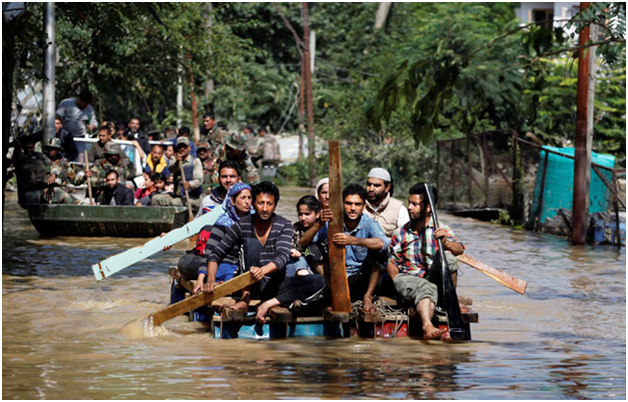A View From Kashmir: Television Anchors or 'Tyrants'?
Does the Nation want to know: Kashmiri's rescuing stranded residents during the floods

NEW DELHI: Kashmir is a complex issue that does not lend itself to simplistic analyses on television channels.
But TRP driven television insists on turning Kashmir into a high decibel issue, with all contrary voices from within the state being drowned out. Times Now Anchor Arnab Goswami is particularly insistent on not listening to those who do not agree with his views at any particular point in time.
A news television studio that should invite debate and discussion is turned into a military dictators arena, with the anchor surrounded by retired Army officers and bureaucrats insist on a ‘either you are with me or against me’ policy that makes it difficult for the more rational people to speak without shouting to be heard.
For both known as well as unknown reasons it has become fashionable for some television ‘dictators’ to humiliate dissenting voices; and warn participants of serious consequences in case they do not adhere to certain principles set by the anchor. They are told in no uncertain terms to either behave well while concurring with the anchor’s assertions or leave the show at their own peril.
Inside the television studio the anchors are at liberty to misuse their power and authority to direct their producers either to reduce the volume of the sound, or even take them off the air for a while.
In a so-called debate on Times Now the other day the chief anchor was alarmed why Kashmir’s leader, Syed Ali Shah Geelani, showered praise on slain militants and referred to them as ‘martyrs’. He and the panel of experts wanted sedition charges to be slapped against Geelani.
“What Geelani has been saying in praise of dead militants in Tral, Sopore and Shopian is a criminal offence. He is arousing passions against the Indian State. He is waging war against India. It is high time to take stern action against him,” said one of the participants.
“Geelani can’t hold our [India’s] democracy to ransom. There is a limit how far he can go,” the anchor added.
But before television gets Geelani booked anchors like Goswami should also be telling ‘His Nation’ what the law should do with the thousands of other Kashmiris who attended the funeral of those killed in encounters in different parts of the Kashmir Valley?
Goswami refers to every single Kashmiri, with a different opinion, as “paid agents of Pakistan”. He ridicules his participants and asks them provocative and often nonsensical questions like ‘what is their rate list for speaking against India and fighting against the Indian State’?
When the anchor asked the similar question to Hilal War, a lesser-known Kashmiri leader, he responded by asking a counter-question, “What was the rate list for Bhagat Singh for fighting against the British army?”
Indian television would acquire some legitimacy if it covered Jammu and Kashmir with honesty, and portrayed all sides of a story. During the floods the television channels virtually blacked out the role played by the youth in rescuing thousands of persons at risk to their lives. The stories of ‘half widows’ waiting for their husbands, taken away by the police or army or paramilitary forces, to return; the fake encounters; the enforced disappearances; the search for justice are all major issues that are ignored by the media in New Delhi with the focus twisting the tale.
The status quo on Kashmir and delay in its political resolution is costing precious human lives on all sides. And it is a challenge for politicians and civil society across the board to make serious efforts to save lives and understand that conflict management and status quo could actually put future of Kashmir’s young generation at risk and also radicalize the youth intellectually. There is an urgent need for conflict resolution.



